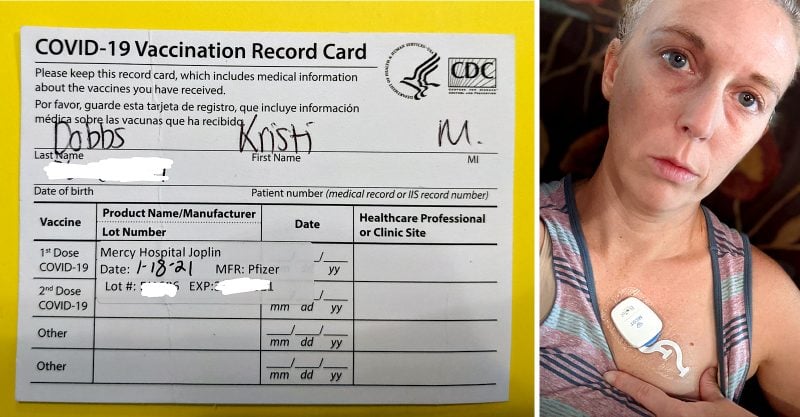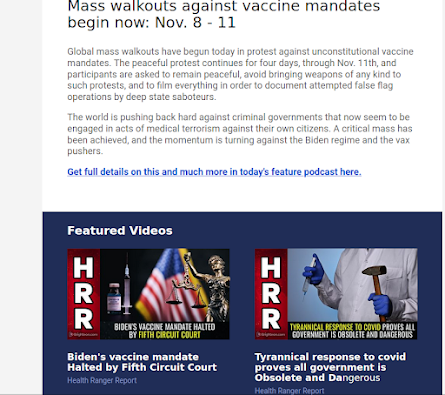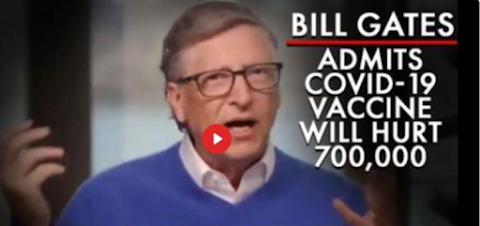Exclusive: Woman Injured by COVID Vaccine Pleads With Health Agencies
Exclusive: Woman Injured by COVID Vaccine Pleads With Health Agencies for Help, as Local News Agency Kills Story After Pressure From Pfizer
In an exclusive interview with The Defender, Kristi Dobbs recounted how she’s spent nine months pleading with health agencies to research the neurological injuries she developed after Pfizer’s vaccine, and how she and others are trying to get the word out about the vaccine’s potential risks.
The Defender is experiencing censorship on many social channels. Be sure to stay in touch with the news that matters by subscribing to our top news of the day. It's free.
Kristi Dobbs, a 40-year-old dental hygienist from Missouri, said she can no longer work after being injured by Pfizer’s COVID vaccine. She has spent the past nine months pleading with U.S. health agencies to research the neurological injuries she and others are experiencing in hopes of finding a treatment.
Since getting the vaccine, Dobbs has seen 16 different medical providers. She’s been on 22 different medications to address more than 20 different symptoms — none of which she had prior to getting the vaccine.
Dobbs said she and others who developed neurological injuries after getting a COVID vaccine shared their experiences with a reporter, in hope of raising awareness about their experiences.
But the story never ran because, according to the reporter, a “higher up” at Pfizer pressured the news agency to drop it.
Dobbs got her first and only dose of Pfizer’s vaccine on Jan. 18. She immediately experienced an adverse reaction on-site at the hospital clinic where her vaccine was administered.
“I had barely sat down in the monitoring area after the inoculation and felt an odd tingling sensation running down my left arm, where I had just received the jab,” Dobbs wrote. “I immediately had a pre-syncope episode, where I thought I was going to pass out, heart palpitations, increased pulse, increased respirations and a blood pressure spike that was within a stroke-worthy reading.”
Dobbs was monitored for an additional 45 minutes. When her blood pressure dropped to a manageable range, she was released.
Dobbs said the people monitoring her brushed off her symptoms as a panic attack or hot flash. But she had never been afraid of vaccines, blood draws or needles. “I gave injections in the mouth as a hygienist, so it was no big deal to me,” Dobbs said.
Three days later, Dobbs woke up in the middle of the night and thought her whole bed was shaking, but her husband said he didn’t feel it. She also noticed shaking and trembling in her left hand, but thought maybe it was due to having coffee.
The next day, Dobbs felt a stabbing pain in her left scapula, and shaking and trembling sensations in both hands. As each day progressed, her symptoms worsened. “By day 10, I was in excruciating pain,” Dobbs said.
On Jan. 28, Dobbs went to a chiropractor in St. Louis to see what was causing the stabbing pain in her scapula and the radiating pain and tremors in both arms. The chiropractor thought she had a rib out, so he adjusted her.
The next morning Dobbs woke up with extreme pain and tremors throughout her entire body.
Dobbs wrote:
“On January 30, I’m in urgent care with stabbing pain in my left scapula regions, full body tremors, paresthesias from head to toe, swollen lymph nodes, tinnitus, dizziness, headache and an odd internal vibrating sensation.
“Urgent care doctor thinks I am having muscle spasms, and thinks I am stressed because of my mother in law [who was battling cancer] and traveling so much, so he [prescribed] Flexeril and Medrol dose pack.”
On Feb. 1, Dobbs visited a local chiropractor to see if she could help with the symptoms. As they were catching up, the chiropractor noticed Dobb’s tremors, body shakes and “super high” blood pressure.
Dobbs wrote:
“At this point I am having problems regulating my BP, and she knows that this is out of character for me. She asks me what I have done differently since I saw her last and I can’t think of anything, except the Pfizer vaccine.
“BINGO … That’s it, she says! She immediately stops and tells me that I need to get in to see my primary care provider.”
On Feb. 2, when Dobbs saw her primary care provider, she had visible tremors and whole body paresthesia. “[My care provider] had no clue if this could be vaccine-related, but didn’t dismiss the fact,” Dobbs said. “It was too new to tell, and she had no knowledge of any reactions.”
The doctor recommended anti-anxiety medication, ran labs, did a physical exam and sent her on her way. Shortly after, Dobbs experienced issues with heavy legs, and trouble walking and getting up stairs to the point she couldn’t feel pin pricks on her legs.
On Feb. 5, Dobbs went to the ER because she said she felt like she was dying.
She said:
“I had full-body paresthesia, internal tremors/vibrations, essential tremors in my hands, tremors in my arms and legs, fatigue, brain fog, muscle pain and weakness, pelvic pain, irregular menstrual cycles that included heavy bleeding and thick clotting, skin rashes, tinnitus, temperature regulation issues, swollen lymph nodes, loss of appetite, weight loss, dizziness/balance issues, blood pressure regulation issues, neck pain, headaches, heart palpitations, convulsions or pseudo seizure at night and insomnia.”
Like many others who have experienced neurological reactions to COVID vaccines, Dobbs had a CT scan and the results were normal. No other tests were performed.
“Doctors did not dismiss that this was vaccine-related, but they had no clue what to do or how to treat it if it was,” Dobbs said. “I was given another anti-anxiety medication, which did nothing for me, and was referred to a neurologist. In the meantime my vibrations, brain fog and other symptoms intensified.”
Dobbs saw a neurologist on Feb. 12, when the nurse practitioner ordered tests, an MRI and blood work. The MRI was normal, and Dobbs was prescribed another medication. Dobbs began searching for answers on her own.
She said:
“I was searching for answers on my own, and I came across an article in Neurology Today with a comment at the bottom of the article from a retired gastroenterologist who had been injured by the vaccine, and she left her email address. That was the day I knew I was not alone in this vaccine injury journey. I had found Dr. Danice Hertz. She was in contact with a few others injured as well.”
Dobbs said she and others started a private social media group to collaborate because their local doctors did not know what to do and “elite doctors” either don’t know what to do or “were unwilling to help us.”
Dobbs said the vaccine injury group grew by 400% in two days and, in under a year, thousands of injured people had found each other. “Soon we all knew we were not alone, yet no one had answers yet,” she said.
“Danice [Hertz] emailed doctors every day for help,” Dobbs said, “and it wasn’t until March 9 she got through to Dr. Avindra Nath at the National Institutes of Health (NIH), and I was able to call them and get a telehealth appointment with Dr. Farinaz Safavi.”
Dobbs said Safavi was aware of these neurological vaccine reactions — as the NIH was already seeing patients for injuries like these — and recommended a “whole host of new tests run by my hometown doctor, as well as certain procedures she thought could potentially cure me.”




Comments
Post a Comment